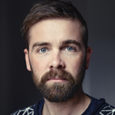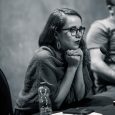It was set to be the biggest show of her life — performing on a large outdoor stage in front of thousands of people at a Pride party unrivaled in size across the region. But in the days leading up to the event, Lili was having serious doubts about whether he, and his drag-queen alter ego, Diva, were ready.
Part of the concern was by now familiar. As a self-confessed worrier by nature, Lili was no stranger to endless thoughts and scenarios playing out over and over in his mind. Was the music the right choice? How would the audience react? Were those feelings inside excitement or nerves?
Such anxieties had been faced and overcome many times before as Diva had emerged as a pioneer in the budding Kosovo drag scene; just a couple of years earlier, she had been one of only two queens to perform at the country’s inaugural drag show, after five others had withdrawn at the last minute in the face of mounting public attention.
But even as someone somewhat accustomed to breaking taboos, preparing to step out onto the Manjež Park stage at Belgrade Pride 2019 as the first Albanian drag queen to perform in Serbia felt like a gut-wrenching leap into the unknown. “I had so many questions in my head and everything felt blurry,” recalls Lili, who asked to only be referred to by his nickname and stage name for privacy reasons.
Part of him was proud that, alongside his fellow Kosovar performer, Icy, he was taking an important step to break down unseen barriers. After all, he was determined to show that shared values, human rights and equality could trump even the most pernicious politics. But there was also the nagging voice of doubt. What if I’m rushing this? Does it have to be me? How will they respond when they know I’m from Kosovo?
Despite having attended three previous Belgrade Prides as a regular participant without incident, as he waited in the wings, the heavy security presence surrounding the event did little to subdue Lili’s fears. Acutely conscious of the history between Serbia and Kosovo, another question kept involuntarily entering his head: Am I safe?
His apprehension was compounded by his last-minute choice of song. Gripped by uncertainty about whether he would be able to fulfill his commitment, Lili had only chosen one with 24 hours to go. Eager to adapt to his hosts, he had considered picking a Serbian song, but ultimately he had contacted the organizers in Belgrade and asked if he could use an Albanian song instead. His request had been accepted immediately.
Even then he’d had a dilemma. How could he ensure that he picked a song that both respected the space he had been given for expression and that wasn’t open to any misinterpretation? “I didn’t want to pick a tendentious song, I didn’t intend to raise anyone’s pulse,” he says.
Steering away from anything more traditional that had the potential to be misconstrued, he had ultimately plumped for a newly released pop song by Dafina Zeqiri and Tayna. With the tune loaded up on the sound system, Lili composed himself, stepped out into the spotlight and introduced Diva to the colorful crowd.
They went wild.
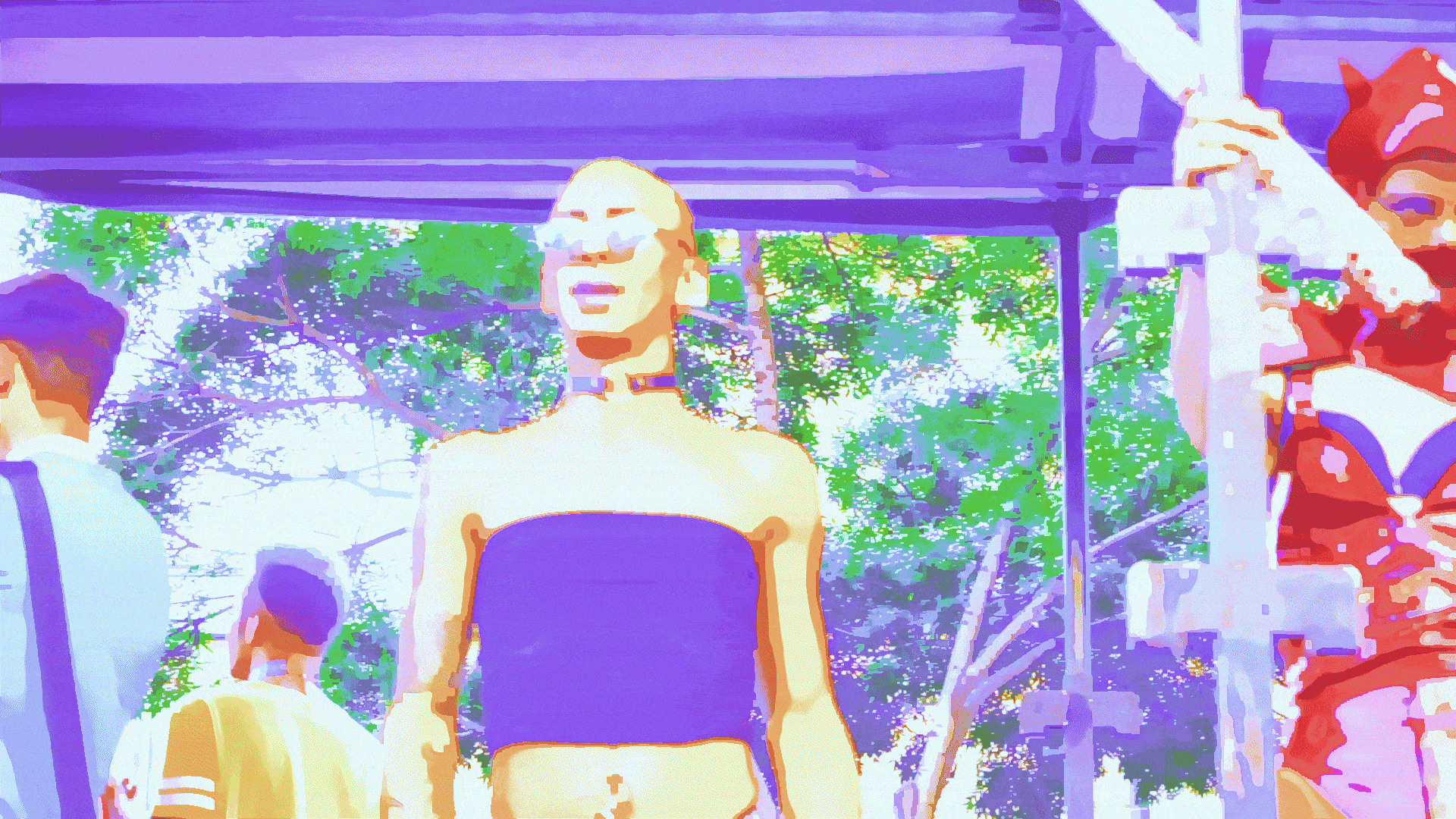
Building a ‘Balkan family’
As Diva and Icy twerked and pulsed away to “Bye Bye” on the stage, one of those sending positive vibes to the Kosovar performers from the audience was Marko Mihailović. Through his role as a Belgrade Pride organizer, it was Marko who had invited the Prishtina queens in the first place and he had been the person to instantly support their decision to perform to an Albanian song.
Looking around the adoring crowd, Marko could see that the song, and the performance, was already an instant hit. This was nothing less than he had expected within the relatively small bubble of the LGBTI+ community and its allies at the open-air party. What he was less sure about was the reaction of the Serbian press.
Anticipating almost universally negative reviews, when he checked the headlines the following day, certain quarters of the Serbian media predictably lived up to their reputation of espousing hostility and hatred toward anything Kosovo-related. But reading the coverage in other outlets, he was pleasantly surprised at the supportive words used about the Kosovar queens, who he describes as part of his “Balkan family.”
“In my country, there is a predominant narrative that the Albanians are enemies and that they are bad people by default, and it is simply not true,” he says. “It is hard for other people who don’t have the opportunities that I’ve had to meet people from [Kosovo] to understand that they are human just as we are and that we need to disregard the negative political narrative and simply have an open soul and open mind.”
For Marko, opportunities to meet and start spending time with people from Kosovo had begun back in 2016 when he first started working as an intern in the human rights organization Civil Rights Defenders (CRD). It was the first year that he had taken part in Belgrade Pride as an organizer, rather than a participant, and in CRD’s offices he suddenly found himself surrounded by LGBTI+ and other human rights activists from neighboring countries.
At the time, Montenegro and Albania were the only other countries in the region to have held Pride events but there was ever-increasing organization amongst LGBTI+ movements. Kosovo had recently held its third annual march to mark the International Day Against Homophobia, helping to move the issue of LGBTI+ rights from the private domain to the public sphere, and activists in Prishtina were preparing to host the country’s first ever regional LGBTI+ conference the following month.
“I think we build connections, we build bridges.”
Marko Mihailović
The development of LGBTI+ rights organizations was also helping to forge closer links between LGBTI+ movements from Tirana and Tetova to Sarajevo and Novi Sad, as groups began to share their experience and regularly start taking delegations to each other’s Prides and other events.
Some of the visitors in CRD’s Belgrade offices that week had had few opportunities to meet fellow activists from the region until that point but had simply come to lend their backing to a common cause. But many had already met each other at the increasing number of donor-funded regional workshops and conferences and they wanted to show solidarity with their new friends.
“I think we build connections, we build bridges,” Marko says, “and I think at this stage of the development of our region it’s extremely important to form human relationships above professional ones. These are the ones that help us to get a sense of the other and to understand the other side, because in our countries you rarely get to hear the other side.”
Forced into double-lives
To many older people in the region, the relative protection and inter-regional connections enabled by donor-backed structures in the past seven or eight years is almost a luxury that they could not have imagined when they were growing up.
“If it wasn’t for the organizations, today they would kill a gay person and nobody would care,” says Arber Nuhiu, who founded Kosovo’s first LGBTI+ organization in 2005. “The moment you react [as a rights organization], you issue a press release, you talk about it, give legal assistance, you take the case to court — people stop and think twice. That’s why the community is coming to the surface, because they feel safe.”
With gay sex treated as an illegal offense in much of the region until the 1990s and little public acknowledgement of even the existence of same-sex attraction, for decades the only option for most people discovering their sexuality was to be forced into secretive double-lives. How this played out varied from place to place, depending on the specific political and societal realities of the time.
In Kosovo, the majority Albanian population already had to navigate public space cautiously during the ’90s as they suffered a decade of systemized state repression. For gay Albanians, the obstacles were multiplied, and one of the only available forms of performing their sexuality was through discreetly visiting “cruising areas.” Here, men — many of whom had felt societally obliged to marry women — would meet up clandestinely with other men to have sex. In some instances, friendships would also form, but often people were too afraid of being publicly identified to even tell each other which town they were from, let alone their real names. Without support or access to information to fully understand the concept of being gay, many of those visiting the cruising areas felt a deepset sense of confusion and shame.
“The LGBTI community was not even marginalized,” Arber says. “Back then it didn’t even exist as a community.”
In some parts of Yugoslavia, there were at least the initial signs of organized activism providing some kind of structures for increased awareness of rights and expression. Slovenia led the way with the first lesbian groups established in the mid-’80s and was considered to be in the vanguard of LGBTI+ activism across the region and beyond. In Croatia and Serbia, things were a little slower as nebulous efforts to organize in the early ’90s were set back by the wartime political climate, and many early activists instead diverted their efforts into the anti-war movement in the first half of the decade.
Such early initiatives helped to open up limited possibilities for LGBTI+ people from other parts of the region to at least connect with each other, though meetups were still overwhelmingly restricted to private spaces and for those with personal connections.
Despite all the obstacles, stories of surreptitious regional meetups and private exchanges between — often married — gay friends wishing to show solidarity with each other are well known by today’s activists.
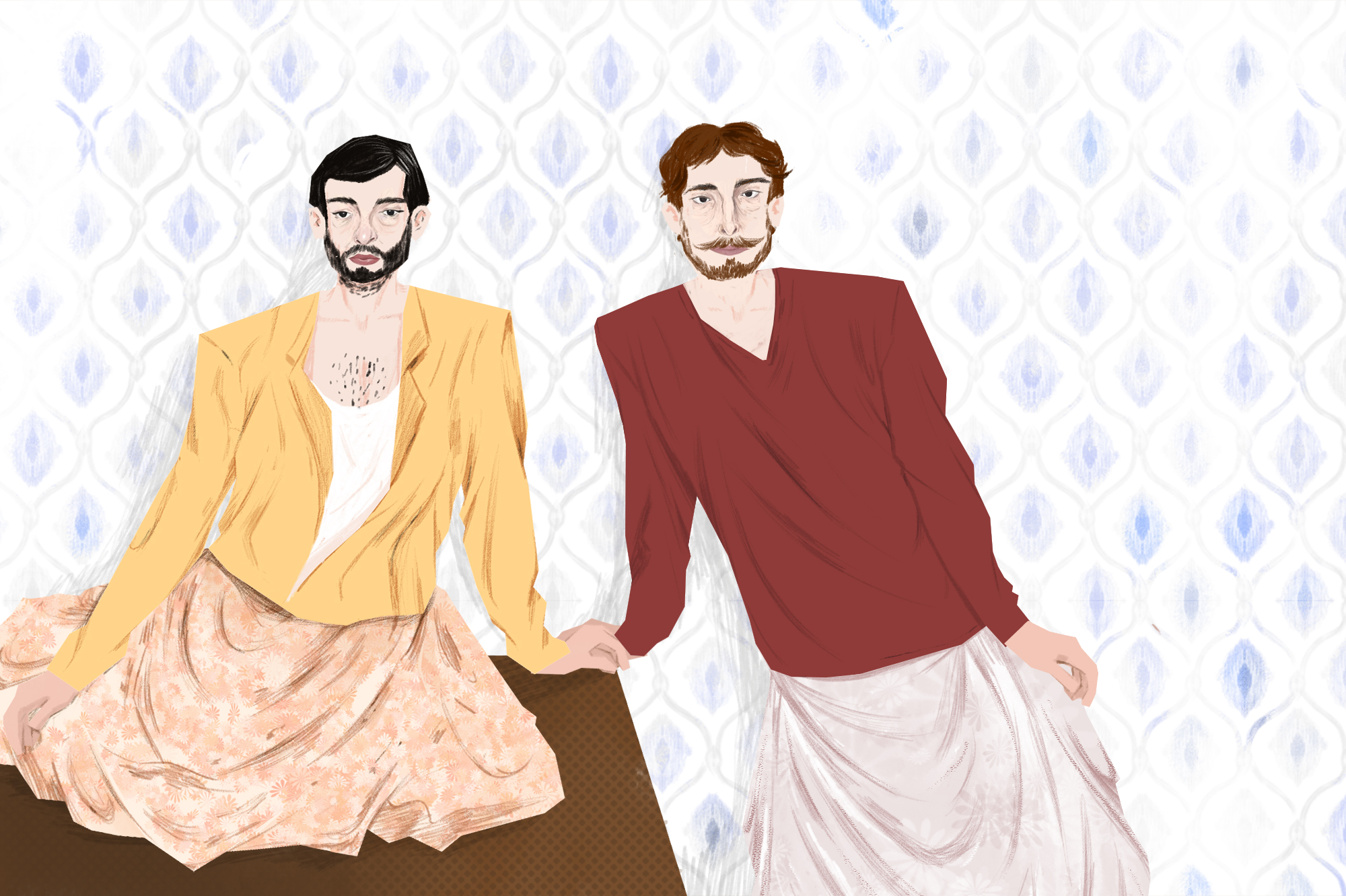
Illustration: Urtina Hoxha / K2.0.
Bekim Asani, an activist from North Macedonia who founded the LGBTI+ United Association in Tetova, has heard many fond memories being regaled by older members of the community, who would hold regular gatherings. Always set in advance due to the limitations of communications at the time, they would relish the all too brief opportunities to escape their hometowns for a bit of respite in a private setting that allowed them to be themselves.
One tale, of events that took place around 40 years ago, has become almost the stuff of legend.
“There was a man whose wife realized that he was bisexual or gay and she accepted him,” Bekim recounts. “In order for him not to be judged by the family, they moved abroad. They made a good living and every time he would return to Tetova, they would invite all members of the [LGBTI+] community to gather at his place. He told me, ‘A man from Kërçova would come wearing the dimija [traditional womens’ trousers] of his wife, another one from Ferizaj…’
“Even now when I go to Prishtina, I meet people who ask me whether I know that man from Tetova — of course I know him! They say that they spent time together at his place… they would set their meetings through landline phones.”
A shared reality
With a history of finding ways to link up even in the toughest of circumstances, it should perhaps come as little surprise that two decades after the last war in the region came to an end, LGBTI+ people are today helping to lead the way in terms of reconciliation. Whereas some areas of society have made little effort to develop ties or have been unable to forge strong relations, LGBTI+ groups have formed genuine connections. “Just leave it to the gays!” jokes Prishtina-based activist Rajmonda Sylbije.
At one level, this can be seen as the natural result of a common cause — that progress in one part of the region often, in time, can lead to progress in another. A law passed in Belgrade or Podgorica can invariably lead to momentum and pressure on governments in Sarajevo or Tirana to follow suit. But this is also true with other issues where mutual interests have not, in themselves, been enough to overcome national divisions.
A key element of the burgeoning cross-border relations between LGBTI+ activists is that their cooperation is being built on profound shared experiences of exclusion, rather than more abstract notions that are not personally relatable.
“With LGBTI people going through the experiences of rejection, discrimination, stigmatization or exclusion from many spaces in their private and professional lives, I think they identify less with these concepts of nation-states,” says Antonio Mihajlov, an activist from North Macedonia.
Particularly when it comes to the issue of identity, people often feel closer affinity with others who can understand what it feels like to be marginalized than with an institutional construction or ethnic identity that has never fully accepted them for who they are. It is this ability to comprehend a shared reality that has quickly enabled bonds of kinship between LGBTI+ activists in the region that have transcended the organized activities that initially brought them together.
“When you get stuck somewhere, when you are in trouble, when you have a problem, when you are left out in the streets, you don’t always need institutional help,” Bekim says. “In my home, the question, ‘What are they?’ has never existed… These are unimportant matters. The problem we have as Albanian LGBT people, Macedonian LGBT people, Turkish LGBT people, Roma LGBT people are the homophobes and the patriarchal society — the system that does not protect us.”
The elephant in the room
Even with the best intentions in the world, however, the fight for basic rights and freedoms does not take place in a vacuum, somehow outside the context of wider political tensions and social fractures. Years of division and limited contact between young people of different backgrounds around the region have led to generations growing up within their own spheres, with little direct knowledge of the other. Such parallel realities are not simply reconciled with good will alone.
One of the most stark examples came at an early drag show in Prishtina in 2019.
Inspired by attending drag shows in Belgrade, activists in Kosovo had teamed up with Serb friends to organize their own drag party and had invited a queen from Belgrade to perform. Like most young Serbs, the queen had not visited Kosovo before and knew little about it. After nervously apologizing for “whatever Serbs did to you” and urging the crowd not to hate her, she broke into her performance.
The song she’d chosen was a party banger in Serbia by one of the country’s eminent stars, the “Serbian Mother,” Ceca. But while some in the crowd tried to smile and enjoy the performance, others turned to their friends aghast and muttered about the “Shki” (a derogatory Albanian term for Serbs) music that had killed their vibe. For them, this was no party tune by a harmless “queen of kitsch.” This was the tune that Serbian paramilitaries had partied to after massacring Albanians during the 1998-99 war, sung by the wife of Arkan, the most feared paramilitary leader of them all.
Such blunders along the way are perhaps unsurprising as young activists attempt to repair some of the damage of decades of division. But they are also indicative of the challenges they face, particularly in the absence of any broader reconciliation between societies in a region that leaves significant historical and political issues unaddressed.
As they build friendships and collaborations, activists have to decide how to approach political or historical issues that could cause tension. For most, such topics are simply set aside completely and priority given to the “greater cause” that unites them.
“Among us LGBTI activists and others there are nationalists, radicals, religious people, everything!” Bekim says. “But we have a joint cause. What makes us vulnerable is the fact that we are seen as different by the majority and we should not be divided amongst ourselves. Of course there are things we don’t agree upon, for example I can never agree with [some] LGBTI activists from Belgrade on Kosovo, but we should stand in solidarity with each other when it comes to LGBTI matters.”
But as the visibility of LGBTI+ rights improves, and more people feel able to align with the cause, some fear that the very openness that has been the movement’s biggest strength to date could become a vulnerability.
Just like everyone else in the region, LGBTI+ people are constantly exposed to political rhetoric that espouses alienating narratives and increasingly populist sentiments. Despite most LGBTI+ people knowing what it feels like to be vilified, history shows that when people’s lives are difficult, the lure of a common enemy, an oft-repeated myth or a simple solution can be a powerful one.
“There are a lot of people from the community who are turning toward nationalism, and for me it is a very dangerous trend that I think is indicative that in the 20 years we have grown apart, we haven’t really done too much to get back together,” Marko says. “With the growth of the LGBTI community, there comes an influx of people who no longer necessarily share all of our values.”
Setbacks and progress in North Macedonia
Nowhere is the negative impact of nationalism on the LGBTI+ community more apparent than in North Macedonia, where years of destructive politics have played on people’s fears, stoking resentment and stagnating progress.
In the 2000s, the country was emerging as one of the regional LGBTI+ scene’s leading lights, particularly for people from neighboring Kosovo. With opportunities for nightlife that simply didn’t exist in Prishtina, Skopje’s cafes, bars and underground meeting points became a regular stomping ground for Kosovars seeking greater freedoms than were possible at home. “I remember Skopje as the first place where I saw gay life, because it was more accessible for gay life,” Rajmonda says.
Simultaneously, the first LGBTI+ activism was taking root in Macedonia and going from strength to strength. By the early 2010s, numerous LGBTI+ organizations had been established and venues such as Skopje’s Damar coffee bar were a popular destination for Eurovision parties, masked balls and the annual “Miss First of April” contest, where men would dress as women to compete for the coveted title.
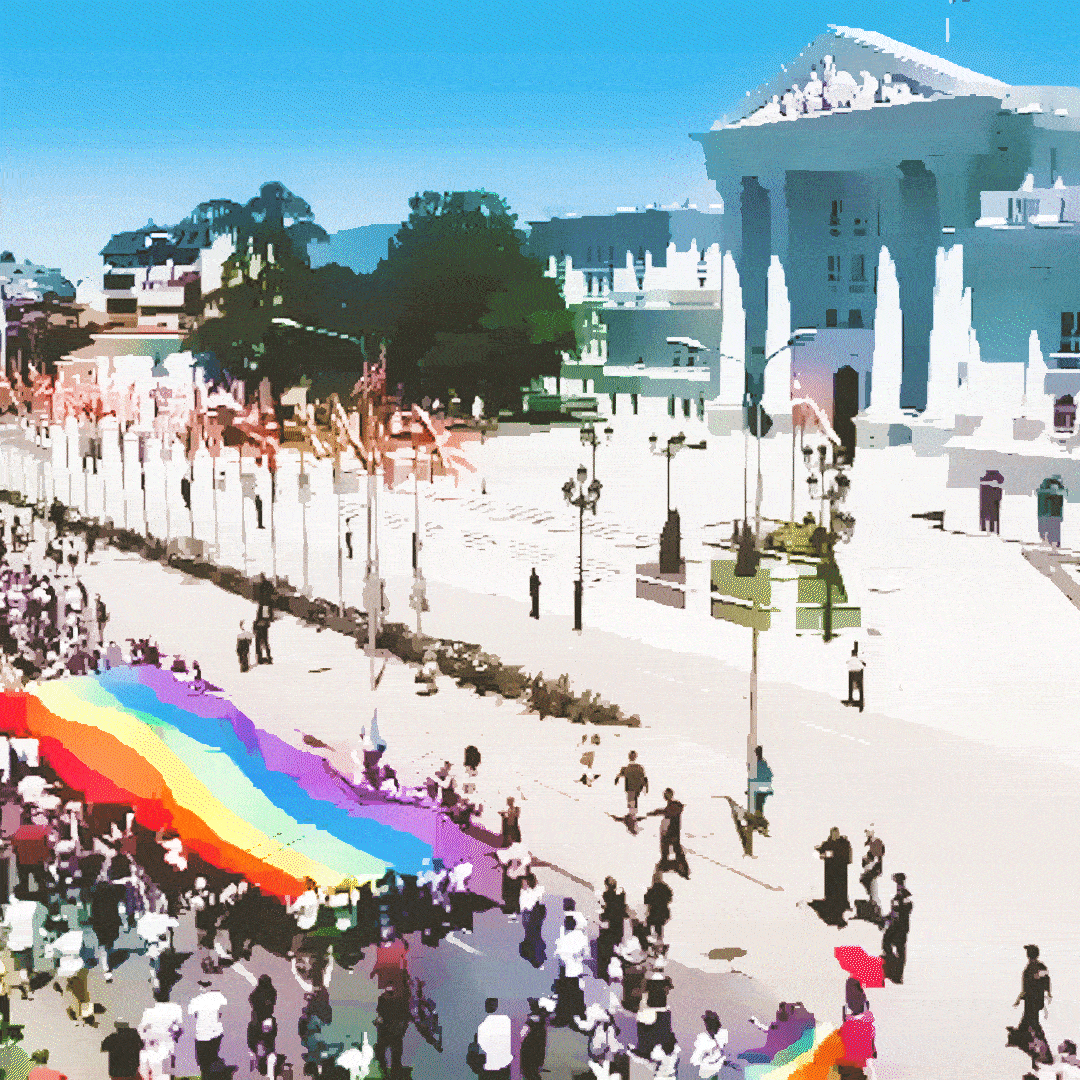
But the political context within the country had also begun to shift as Nikola Gruevski’s autocratic regime was stirring societal discord.
In his world of “patriots” and “traitors” Gruevski and his conservative nationalists sought to divide and conquer by sewing the seeds of conspiracies and identifying enemies everywhere. Under the guise of protecting “traditional values,” and promoting a dubious show of Macedonian heritage, Gruevski frequently spewed rhetorical bile, accusing those who opposed him of being in the grip of foreign powers or trying to impose “Western values.”
By the time Gruevski left power in 2016, Macedonia had gone from an EU-frontrunner to virtually an international pariah. Amidst an atmosphere of hostility and intimidation, many LGBTI-friendly venues had closed their doors, activism had stalled and almost every other country in the region had overtaken Macedonia in terms of legal protections provided for LGBTI+ rights.
“Back then it was still such a conservative political context because conservatives in Macedonia were in power and the LGBTI community was very very afraid,” says Elena Petrovska. The activist, who today works at the Skopje-based Coalition Margins, admits that she had never dared to work for an LGBTI+ organization until mass protests against Gruevski’s regime in 2015 gave her hope that things in the country were beginning to change.
Under the newly formed social democrat-led government, there were immediate signs of change. The Assembly established an inter-party parliamentary group to work on improving the rights of LGBTI+ people, a comprehensive new anti-discrimination law was passed, and in 2019 Skopje finally became the penultimate capital in the region to hold a Pride Parade (with Sarajevo holding its first parade two months later).
As was by now a common theme at Prides throughout the region, fellow activists enthusiastically made the journey from towns and cities near and far to share their solidarity, including a whole busload from Prishtina. In a further example of LGBTI+ activists being at the forefront of breaking down barriers, there were even public shows of support from other neighbors, which would have been barely conceivable just a few years earlier.
“[Activists joining from] Sofia Pride, who we didn’t know would come until the very last day, was really a surprise, as well as a speech by a Greek activist in the Macedonian language,” Antonio recalls. “I think we got a very nice lesson in public.”
Slow road to recovery
For all the signs of progress, however, not all the damage caused to the fabric of society in North Macedonia by years of antagonism can be so easily undone.
Echoing cleavages that are present throughout the country, Bekim asserts that he has struggled to build close ties with his counterparts in Skopje, pointing to the combined pressures of a prevailing conservative mindset amongst his hometown’s Albanian-majority population and the lack of anonymity that comes with life in a smaller town. “They’ve never understood my position, what it means to be an LGBTI+ activist in Tetova, because it is a completely different mentality, a different society,” he says. “I can say that only 10% of the activists were with me when something happened — with Prishtina and Tirana it wasn’t the same, they were always the first.”
As he looks to organize Tetova’s first Pride parade later this year, Bekim plans to seek advice from fellow activists in other smaller cities in the region, such as Novi Sad in Serbia and Burgas in Bulgaria, believing they will be able to relate to the specific challenges that face activists outside of bigger urban centers.
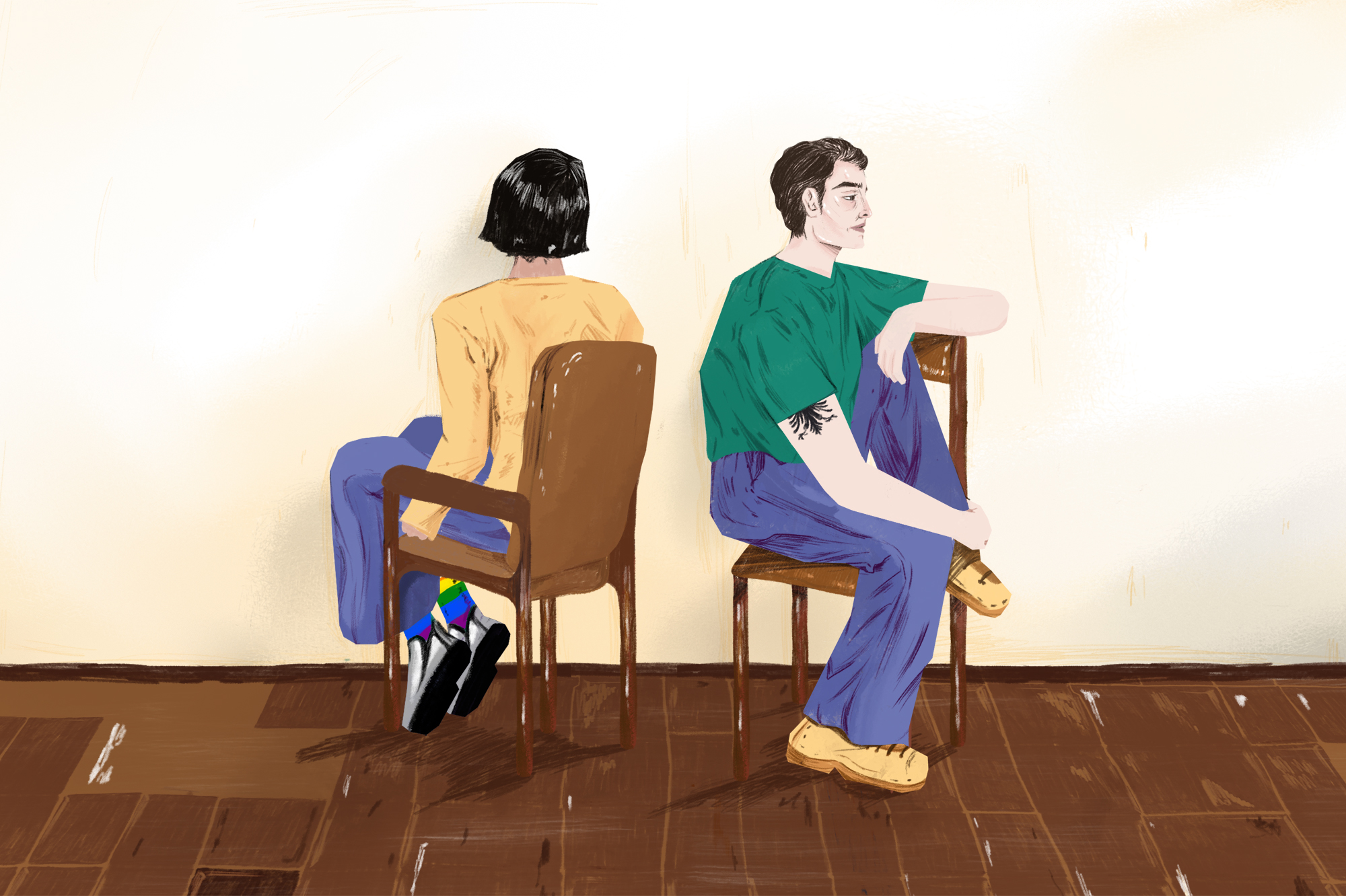
Illustration: Urtina Hoxha / K2.0.
Finding ways to build a more inclusive movement within North Macedonia is similarly on the minds of activists in Skopje, who point to efforts to alleviate the double discrimination of LGBTI+ minorities such as Roma. But there is also a sense that after years of mistrust caused by corrosive politics, there is still much more that can be done.
“I think we need more education and to pay more attention to these topics, especially as an LGBTI movement — to be a point of cooperation and of course peace and solidarity from the national perspective, like national identity,” Elena says. “I believe that we should work more on the inclusivity of the movement in Macedonia, to work more closely with and motivate more, let’s say, Albanians or those who identify as Muslims, to join the activities of resilience. Together, in mutual collaboration with Macedonians. I think we lack that.”
As with so many other areas of life throughout the region and beyond, opportunities for strengthening collaborations have been somewhat reduced over the past couple of years by the COVID-19 pandemic. Projects and events that naturally bring people together have often had to be canceled or moved online, restricting the space to build relations and seek common solutions. But as society has gradually opened back up and holding physical events is once again back on the cards there is hope that better days could be ahead.
“In the future, our relations, especially through … young people who work in culture, in music and queer events, I think it is a future that can bring us closer,” Elena says. “Not in division of our nationalities or of our history or language, but against that, as the first and foremost value of the LGBTI movement.”
From strength to strength
The sense of optimism is not just based on a naive aspiration that positive change could be possible “somewhere over the rainbow.” It has solid foundations in the history of LGBTI+ activism in the region over the course of the past decade and beyond, which has continued to overcome powerful tensions by demonstrating that the movement is strongest when forces are joined together.
There is no stronger example than the way in which community leaders in Kosovo have based the strength of their activism on the lessons learnt from the painful experiences of colleagues in Serbia. In the wake of the violent attacks on Belgrade’s first attempt at a Pride Parade in 2001 and similar scenes at a subsequent effort nine years later, Kosovar activists took note of such setbacks and decided to apply a more cautious approach, building up year by year.
“We always looked at the region and waited, calculated, waited for our momentum,” says Rajmonda, explaining that more lowkey marches in Prishtina in 2014 to 2016 — ahead of Kosovo’s first Pride in 2017 — were no accident. “We were like, let’s test the police, let’s test how many people will join … we didn’t dare endanger a group of people without first knowing how the police would react, how the society would react.”
With activists taking full advantage of their ability to learn from their Serbian colleagues, LGBTI+ activism in Kosovo has gone from strength to strength, growing in visibility and determination year on year.
And the benefits of working closely together haven’t just been seen at an organizational level.
“Through meeting all these people from the region with these events, I grew stronger and stronger,”
Elena Petrovska.
Connections with activists in neighboring countries have helped to give individuals the tools and confidence to raise their heads above the parapet back home where the daily scrutiny and pressures of being who they are can feel particularly oppressive. Across the region, there are numerous examples of people who had not previously felt able to show their true selves in their own countries returning from visits and exchanges with a fresh sense of vigor and belief.
“I know of at least three people who were really afraid of going out in our Prides here,” Arber says. “We took them to Belgrade, and the moment they returned they were like, ‘I’ll go in the first row!’ Imagine, from not wanting to even go, they came back wanting to be in the front row — because they got empowered.”
Such examples are testament to the fact that at the heart of the shared struggle are human connections; relationships being built on trust, empathy and mutual understanding. And a resolve that however tough the struggles, after so many years of ostracization and isolation, they are not alone in their fight for a better future.
“Through meeting all these people from the region with these events, I grew stronger and stronger,” Elena says. “And somehow, when I’m tired, when I’m scared, I say ‘it’s OK.’ Somehow I feel that we are unstoppable in the end — we can be tired but we are unstoppable! I get that energy and then I move on.”
Feature Image: Urtina Hoxha / K2.0.

The regional program ‘RESILIENCE: Civil society action to reaffirm media freedom and counter disinformation and hateful propaganda in Western Balkans and Turkey’ is implemented with the financial support of the European Union by partner organizations SEENPM, Albanian Media Institute, Mediacentar Sarajevo, Kosovo 2.0, Montenegrin Media Institute, Macedonian Institute for Media, Novi Sad School of Journalism, Peace Institute and Bianet.
This article was produced with the financial support of the European Union. Its contents are the sole responsibility of Kosovo 2.0 and do not necessarily reflect the views of the European Union.
Why do I see this disclaimer?






